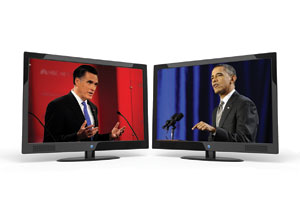CQ WEEKLY – VANTAGE POINT
Sept. 22, 2012 – 11:58 a.m.
Debates Air After Most Have Made Up Their Minds
By Chris Nehls, CQ Staff
Do presidential debates really matter? Ever since John F. Kennedy and Richard Nixon squared off on television in 1960, debates have held an iconic status. They continue to draw enormous audiences, while political junkies note for history each flub, gaffe or quip.

|
||
|
This fall, for instance, pundits are declaring that the Oct. 3 face-off in Denver, the first of three confrontations between President Obama and Mitt Romney, is a do-or-die opportunity for the Republican candidate.
But scholarship on presidential elections strongly suggests that while the presidential debates may make for must-see TV, their impact on voters’ decisions is minimal.
“My bottom line is that you can’t say with certainty that debates don’t matter, but you can’t find any evidence that they do,” says James Stimson, a political scientist at the University of North Carolina at Chapel Hill and the author of the 2004 book “Tides of Consent: How Public Opinion Shapes American Politics.”
Researchers who have crunched the numbers from hundreds of polls over past elections have found that by the time debates are broadcast in the autumn, almost all the people who will vote in the election have already made up their minds. Most of those who tune in already have strong partisan feelings and watch like they would a football game.
Stimson says a better predictor of November’s winner is whoever is ahead before the debates take place. That would give Romney little more than a week to regain momentum, although the candidates were tied in a Gallup tracking poll midway through last week.
This model should prove particularly true in 2012, Columbia University political scientist Robert Erikson says, because “it seems like people have made up their minds earlier than certainly in the distant past and maybe even more so than even in 2008 or 2004.”
The latest Gallup daily tracking poll has the number of undecided respondents at just 6 percent. The true late deciders who show up on Election Day, Erikson says, typically split 50-50 between the candidates.
In his book, Stimson cites the 1980 election between incumbent Jimmy Carter and Ronald Reagan — when the challenger famously asked voters in the final debate if they were better off than they were four years before — as the single instance when late-election polling seemed to indicate that the debates had affected the outcome. Only four years earlier, Carter’s poll numbers went down, not up, after President Gerald R. Ford made a gaffe by declaring that Eastern Europe wasn’t under Soviet domination.
More recently,
Erikson and co-author Christopher Wlezien conclude in their new book, “The Timeline of Presidential Elections,” that voters form preferences through an incremental process that takes months. Data indicates that the made-for-TV events of the party conventions lock in more votes than do the debates.
So do these overdramatized political moments still have a place in presidential elections even if they have little influence on voters? Northeastern University journalism professor Alan Schroeder, author of a book on the first 50 years of debates, thinks so. He says viewers “can’t help but learn something” from the debates. “You’re watching two people talk about serious issues for 90 minutes, and that’s quite rare in modern life.”
Debates Air After Most Have Made Up Their Minds
Schroeder likes one small change in format that the notoriously cautious Commission on Presidential Debates has made for the first session this year: Candidates will be able to discuss specific domestic policy issues in a less formal manner over 15 minutes instead of the classic format that restricts responses to one or two minutes.
“I think the idea of not making these candidates slaves to the clock is a very promising innovation,” Schroeder says.